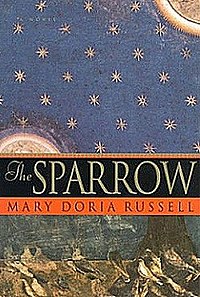So rather than discussing The Sparrow with friends over food and wine at my house (visual enjoyment only, in my case with the wine) instead I'm sitting in my pajamas - which I've been in for 24 hours straight - on my couch in my warm, clean house, writing about the book.
Some of the women in my book club don't read a lot of science fiction, so I tried to sell them on the idea of this book. "I'd like to suggest something speculative, if you're up for a bit of a journey. The genre for this one I'd call literary sci fi, though it's fairly near future and not too far out there." If we amend "literary sci fi" to "literary Jesuit sci fi," does that pique your interest?
The idea is this: when new lands and people are discovered, one of the first groups to get there, every time, have been the Jesuits. Why should space be any different?
I also linked to a reading group guide and this review:
"In clean, effortless prose and with captivating flashes of wit, Russell creates memorable characters who navigate a world of exciting ideas and disturbing moral issues without ever losing their humanity or humor. Both heartbreaking and triumphant, and rich in literary pleasures great and small, The Sparrow is a powerful and haunting book. It is a magical novel, as literate as The Name of the Rose, as farsighted as The Handmaid's Tale and as readable as The Thorn Birds."to prove that the book is absolutely appropriate for a serious book club read.
Not that we only take on serious reads. After all, this group has read Twilight and Just Do It: How One Couple Turned Off the TV and Turned On Their Sex Lives for 101 Days (No Excuses!). But mostly we do read upmarket fiction, the kinds of new novels that come with discussion questions printed on the last pages and require long waits at the library.
Back to The Sparrow. It's a smart book, meaning that it's a book about smart people who don't try to pretend not to be smart. I like that. The characters aren't pretentious, they're just interested in learning stuff. And it's a book that pulls off that amazing storytelling trick of describing something horrific and then making it understandable and a lot harder to judge than you'd assume.
I'm generally not a fan of books that jump around in time, but this book is told in alternating chapters from the "present" (near future) and the future (slightly further near future). This structure works well for the novel because both time lines proceed chronologically and eventually meet. Needing to know how we could possibly get there from here drives the story.
I don't want to give too much away, especially since I went on to read the sequel (Children of God) which picks up where The Sparrow leaves off and almost feels like Part II of the same book. So I will close with this: The characters from Russell's novel felt real to me, and I wish that I knew some of them. The situations felt perfectly plausible - no mean feat in speculative fiction. The moral questions felt absolutely current and relevant and important. I love talking about this book with people (which is why I twisted arms to get my husband and one of my book clubs to read it).
Have you read it? What did you think?
Click icon for more
book review blogs
@Barrie Summy

